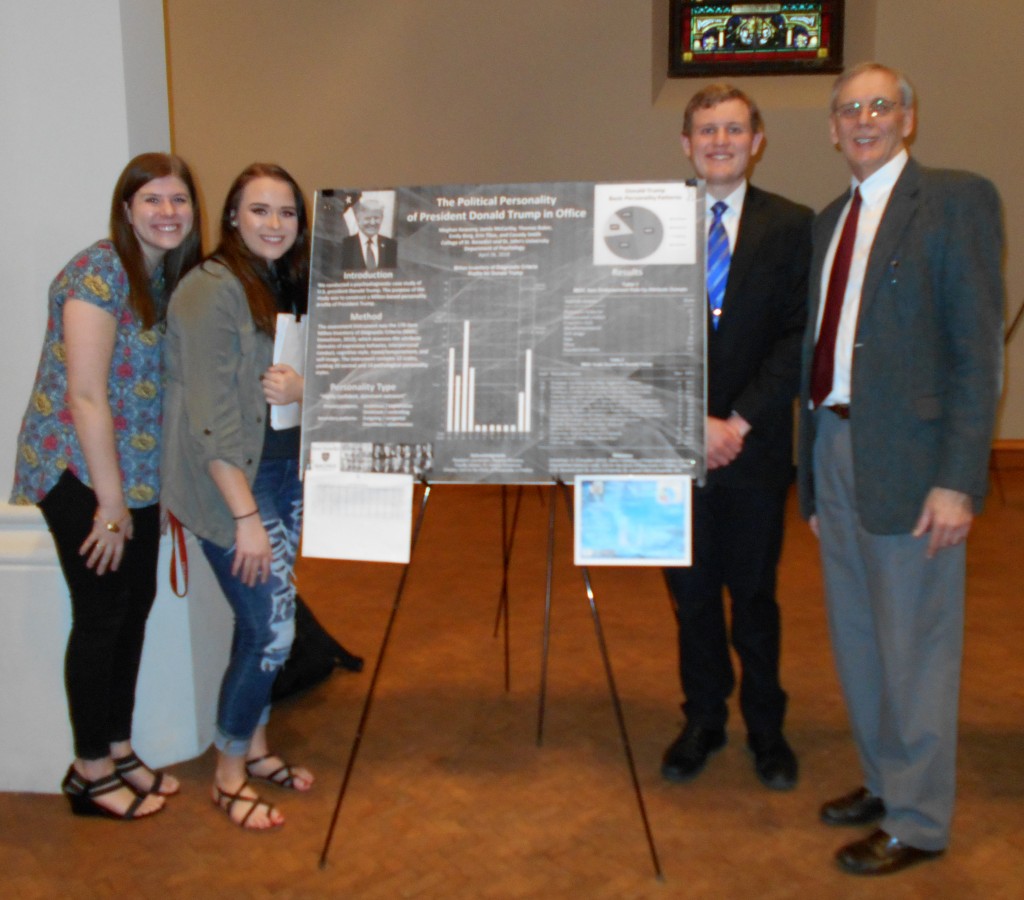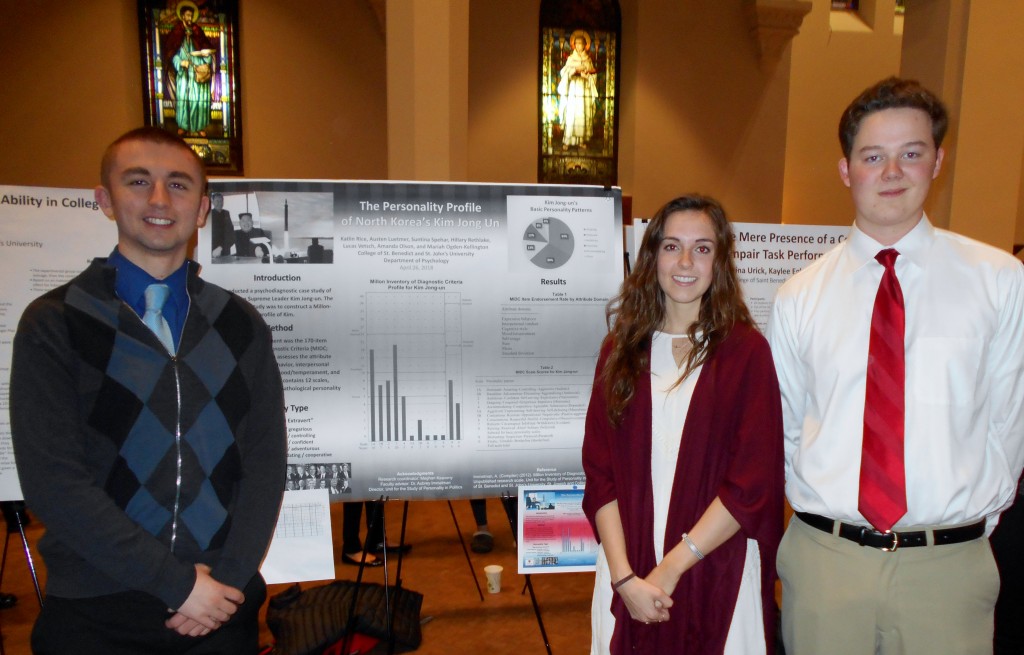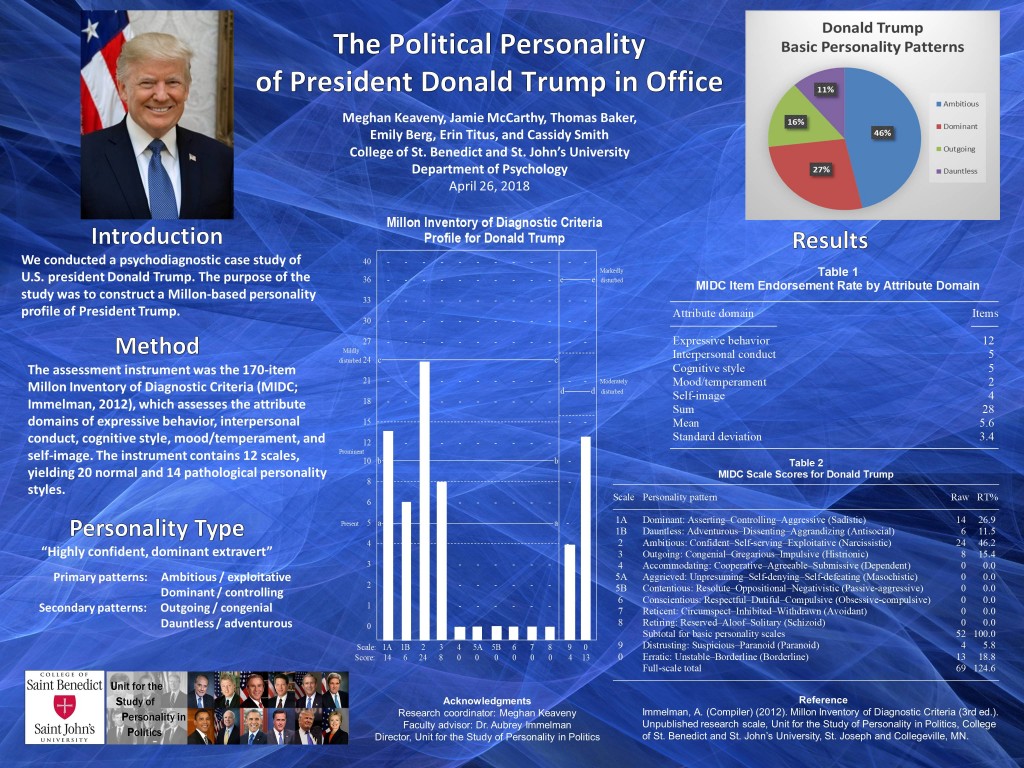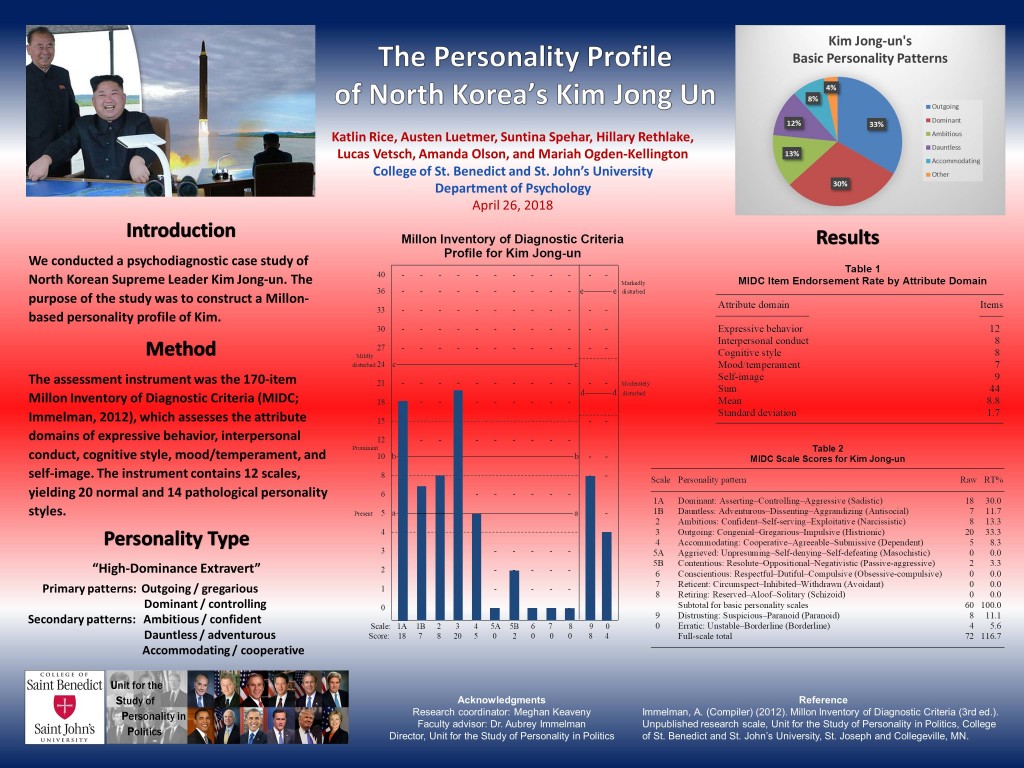Featured Posts

- Index of Psychological Studies of Presidents and Other Leaders Conducted at the Unit for the Study of Personality in Politics
- The Personality Profile of U.S. Supreme Court Associate Justice Brett Kavanaugh
- The Leadership Style of North Korean Leader Kim Jong-un
- North Korea Threat Assessment: The Psychological Profile of Kim Jong-un
- Russia Threat Assessment: Psychological Profile of Vladimir Putin
- The Personality Profile of 2016 Republican Presidential Candidate Donald Trump
- Donald Trump's Narcissism Is Not the Main Issue
- New Website on the Psychology of Politics
- Unit for the Study of Personality in Politics --- 'Media Tipsheet'
categories

- Afghanistan (228)
- Al Gore (2)
- Amy Klobuchar (4)
- Ayman al-Zawahiri (7)
- Barack Obama (60)
- Ben Carson (2)
- Bernie Sanders (7)
- Beto O'Rourke (3)
- Bill Clinton (4)
- Bob Dole (2)
- Campaign log (109)
- Chris Christie (2)
- Chuck Hagel (7)
- Criminal profiles (8)
- Dick Cheney (11)
- Domestic resistance movements (21)
- Donald Trump (31)
- Economy (33)
- Elizabeth Warren (4)
- Environment (24)
- George H. W. Bush (1)
- George W. Bush (21)
- Hillary Clinton (9)
- Immigration (39)
- Iran (43)
- Iraq (258)
- Jeb Bush (3)
- Joe Biden (13)
- John Edwards (2)
- John Kasich (2)
- John Kerry (1)
- John McCain (7)
- Kamala Harris (5)
- Kim Jong-il (3)
- Kim Jong-un (11)
- Law enforcement (25)
- Libya (18)
- Mahmoud Ahmadinejad (6)
- Marco Rubio (2)
- Michael Bloomberg (1)
- Michele Bachmann (173)
- Mike Pence (3)
- Military casualties (234)
- Missing person cases (37)
- Mitt Romney (13)
- Muqtada al-Sadr (10)
- Muslim Brotherhood (6)
- National security (16)
- Nelson Mandela (4)
- News (5)
- North Korea (36)
- Osama bin Laden (19)
- Pakistan (49)
- Personal log (25)
- Pete Buttigieg (4)
- Presidential candidates (19)
- Religious persecution (11)
- Rick Perry (3)
- Rick Santorum (2)
- Robert Mugabe (2)
- Rudy Giuliani (4)
- Russia (7)
- Sarah Palin (7)
- Scott Walker (2)
- Somalia (20)
- Supreme Court (4)
- Syria (5)
- Ted Cruz (4)
- Terrorism (65)
- Tim Pawlenty (8)
- Tom Horner (14)
- Tributes (40)
- Uncategorized (50)
- Vladimir Putin (4)
- Xi Jinping (2)
- Yemen (24)
Links

archives

- November 2021
- January 2021
- November 2020
- October 2020
- September 2020
- August 2020
- July 2020
- April 2020
- March 2020
- February 2020
- January 2020
- December 2019
- October 2019
- July 2019
- May 2019
- April 2019
- March 2019
- February 2019
- January 2019
- December 2018
- September 2018
- August 2018
- July 2018
- June 2018
- April 2018
- March 2018
- February 2018
- January 2018
- August 2017
- July 2017
- June 2017
- May 2017
- April 2017
- February 2017
- January 2017
- December 2016
- November 2016
- October 2016
- September 2016
- August 2016
- July 2016
- June 2016
- May 2016
- April 2016
- March 2016
- February 2016
- January 2016
- December 2015
- November 2015
- October 2015
- September 2015
- August 2015
- July 2015
- June 2015
- May 2015
- April 2015
- March 2015
- February 2015
- January 2015
- December 2014
- November 2014
- October 2014
- September 2014
- August 2014
- July 2014
- June 2014
- May 2014
- April 2014
- March 2014
- February 2014
- January 2014
- December 2013
- November 2013
- October 2013
- September 2013
- August 2013
- July 2013
- June 2013
- May 2013
- April 2013
- March 2013
- February 2013
- January 2013
- December 2012
- November 2012
- October 2012
- September 2012
- August 2012
- July 2012
- June 2012
- May 2012
- April 2012
- March 2012
- February 2012
- January 2012
- December 2011
- November 2011
- October 2011
- September 2011
- August 2011
- July 2011
- June 2011
- May 2011
- April 2011
- March 2011
- February 2011
- January 2011
- December 2010
- November 2010
- October 2010
- September 2010
- August 2010
- July 2010
- June 2010
- May 2010
- April 2010
- March 2010
- February 2010
- January 2010
- December 2009
- November 2009
- October 2009
- September 2009
- August 2009
- July 2009
- June 2009
- May 2009
- April 2009
- March 2009
- February 2009
- January 2009
- December 2008
- November 2008
- October 2008
- September 2008
- August 2008
- July 2008
meta

Students Present Research at Scholarship Day

Emily Berg, Cassidy Smith, and Thomas Baker (pictured with faculty research moderator Dr. Aubrey Immelman) presented their research project, “The Political Personality of President Donald Trump in Office,†at the 18th annual Celebrating Scholarship & Creativity Day, April 26, 2018, in the Great Hall at St. John’s University in Collegeville, Minnesota.
COLLEGEVILLE, Minn. (April 27, 2018) — Psychological profiles of U.S. President Donald Trump and North Korean Supreme Leader Kim Jong-un were presented on April 26, 2018, at “Celebrating Scholarship and Creativity Day,†an annual event to recognize students, faculty, and staff who have undertaken significant research, scholarship, or creative works during the past academic year at St. John’s University and the College of St. Benedict.
Undergraduate students in a Personality Psychology course at the colleges conducted the research under the auspices of the Unit for the Study of Personality in Politics, directed by Aubrey Immelman, Ph.D., associate professor of psychology.
Biographical and life history data concerning the candidates were collected from media reports and synthesized into personality profiles using the third edition of the Millon Inventory of Diagnostic Criteria (MIDC). Following are abstracts of the poster presentations.
——————————————————————
The Political Personality
of President Donald Trump in Office
Meghan Keaveny, Jamie McCarthy, Thomas Baker, Emily Berg, Erin Titus, Cassidy Smith, and Aubrey Immelman
Unit for the Study of Personality in Politics
April 26, 2018
Abstract
A remote psychological assessment of Donald Trump in his capacity as president of the United States was conducted from 2017 to 2018. Psychodiagnostically relevant data regarding Trump were extracted from biographical sources and media reports published after his inauguration as president on January 20, 2017, and synthesized into a personality profile using the Millon Inventory of Diagnostic Criteria (MIDC), which yields 34 normal and maladaptive personality classifications congruent with DSM–III–R, DSM–IV, and DSM–5. The primary purpose of this study, which will continue throughout the Trump presidency, was to compare Trump’s public personality in office to his personality prior to assuming political office, as assessed during the 2016 presidential election cycle.
The personality profile yielded by the MIDC was analyzed in accordance with interpretive guidelines provided in the MIDC and Millon Index of Personality Styles manuals. Trump’s primary personality patterns were found to be Ambitious/exploitative and Dominant/controlling, infused with secondary Outgoing/congenial and Dauntless/adventurous features, possibly supplemented by a slight Erratic/unstable tendency.
In summary, Trump can be characterized as a highly confident, dominant extravert, based on the amalgam of Ambitious, Dominant, and Outgoing patterns in his overall personality profile.
Ambitious individuals are bold, competitive, and self-assured; they easily assume leadership roles, expect others to recognize their special qualities, and often act as though entitled. Dominant individuals enjoy the power to direct others and to evoke obedience and respect; they are tough and unsentimental and often make effective leaders. Outgoing individuals are dramatic attention‑getters who thrive on being the center of social events, go out of their way to be popular with others, have confidence in their social abilities, tend to be impulsive and undisciplined, and become easily bored — especially when faced with repetitive or mundane tasks. Dauntless individuals tend to flout tradition, dislike following routine, sometimes act impulsively and irresponsibly, and are inclined to elaborate on or shade the truth and skirt the law.
Trump’s major personality strengths in a political role are his confident assertiveness, personal charisma, and persuasiveness. His major personality-based shortcomings are of a temperamental nature: impulsiveness and a lack of emotional restraint and self-discipline.
————————————————————
The Personality Profile
of North Korea’s Kim Jong Un
ê¹€ì •ì€
Katlin Rice, Austen Luetmer, Suntina Spehar, Hillary Rethlake, Lucas Vetsch, Amanda Olson, Mariah Ogden-Kellington, and Aubrey Immelman
Unit for the Study of Personality in Politics
April 26, 2018
Abstract
A remote psychological assessment of North Korean leader Kim Jong-un was conducted from 2017 to 2018. Psychodiagnostically relevant data regarding Kim were extracted from open-source media reports and synthesized into a personality profile using the Millon Inventory of Diagnostic Criteria (MIDC), which yields 34 normal and maladaptive personality classifications congruent with DSM–III–R, DSM–IV, and DSM–5.
The personality profile yielded by the MIDC was analyzed in accordance with interpretive guidelines provided in the MIDC and Millon Index of Personality Styles manuals. Kim’s primary personality patterns were found to be Outgoing/gregarious and Dominant/controlling, supplemented by secondary Ambitious/confident, Dauntless/adventurous, and Accommodating/cooperative features. Given his Outgoing–Dominant primary personality composite, Kim may be classified as a high-dominance extravert.
Outgoing individuals are dramatic attention‑getters who thrive on being the center of social events, go out of their way to be popular with others, and are confident in their social skills; they may have an impulsive tendency and be prone to boredom. Dominant individuals enjoy the power to direct others and to evoke obedience and respect; they can be tough and unsentimental and often make effective leaders. Ambitious individuals are bold, competitive, and self-assured; they easily assume leadership roles, expect others to recognize their special qualities, and may act as though entitled. Dauntless individuals tend to flout tradition, conventional standards, and cultural mores, dislike following routine, and may act impulsively and recklessly; they are resistant to coercion and may exhibit a strong need for autonomy and self-determination. Accommodating individuals are notably cordial, cooperative, and amicable; they are willing to adapt their preferences to be compatible with those of others, to reconcile differences to achieve peaceable solutions, and to concede or compromise when necessary.
Kim Jong-un’s major personality-based leadership strength is a distinctly outgoing tendency, supplemented by an accommodating inclination, a fitting descriptive label for which would be congenial–cooperative. Leaders matching this profile can be expected to be jovial, socially gregarious, agreeable, accommodating, and obliging in their relationships with others; they are characteristically gracious, neighborly, and benevolent, preÂferring to avoid conflict and seek harmony with others.

Lucas Vetsch, Amanda Olson, and Austen Luetmer present “The Personality Profile of North Korea’s Kim Jong Un” at St. John’s University, Collegeville, Minn., April 26, 2018. According to the study, “Kim Jong-un’s major personality-based leadership strength is a distinctly outgoing tendency, supplemented by an accommodating inclination, a fitting descriptive label for which would be congenial–cooperative. Leaders matching this profile can be expected to be jovial, socially gregarious, agreeable, accommodating, and obliging in their relationships with others; they are characteristically gracious, neighborly, and benevolent, preÂferring to avoid conflict and seek harmony with others.”
Topical reports on this site
President Donald Trump to Meet North Korea’s Kim Jong-un
(March 9, 2018)
The Personality Profile of 2016 Republican Presidential Candidate Donald Trump (Aug. 9, 2015)
The Personality Profile of North Korean Supreme Leader Kim Jong-un (April 8, 2013)
Research papers
The Personality Profile of North Korean Supreme Leader Kim Jong Un. Working paper, Unit for the Study of Personality in Politics, St. John’s University/College of St. Benedict, April 2018. Abstract and link for full-text (32 pages; PDF) download at Digital Commons: https://digitalcommons.csbsju.edu/psychology_pubs/119/
The Leadership Style of North Korean Supreme Leader Kim Jong Un. Working paper, Unit for the Study of Personality in Politics, St. John’s University/College of St. Benedict, June 2018. Abstract and link for full-text (17 pages; PDF) download at Digital Commons: https://digitalcommons.csbsju.edu/psychology_pubs/120/
The Political Personality of 2016 Republican Presidential Nominee Donald J. Trump. Working paper, Unit for the Study of Personality in Politics, St. John’s University/College of St. Benedict, October 2016. Abstract and link for full-text (31 pages; PDF) download at Digital Commons: http://digitalcommons.csbsju.edu/psychology_pubs/103/
The Leadership Style of U.S. President Donald J. Trump. Working paper, Unit for the Study of Personality in Politics, St. John’s University/College of St. Benedict, January 2017. Abstract and link for full-text (14 pages; PDF) download at Digital Commons: http://digitalcommons.csbsju.edu/psychology_pubs/107/
Leave a Reply
You must be logged in to post a comment.





April 28th, 2018 at 10:18 pm
[…] Psychological profiles of U.S. President Donald Trump and North Korean Supreme Leader Kim Jong-un were presented on April 26, 2018 […]
May 10th, 2018 at 9:33 am
Why is North Korea suddenly being cooperative? Is Trump’s hard stance with sanctions and MAD actually working? (Jeffery Zhang, Quora.com, April 21, 2018) — “North Korea is following Mao’s playbook. Mao developed nuclear missiles under sanctions from both the US and the Soviet Union. Then cashed in those chips to make a deal with Nixon. … More » https://www.quora.com/Why-is-North-Korea-suddenly-being-cooperative-Is-Trumps-hard-stance-with-sanctions-and-MAD-actually-working
April 25th, 2019 at 5:38 pm
[…] Psychological Profiles of Donald Trump and Kim Jong-un Presented at Scholarship Day (April 27, 2018) […]